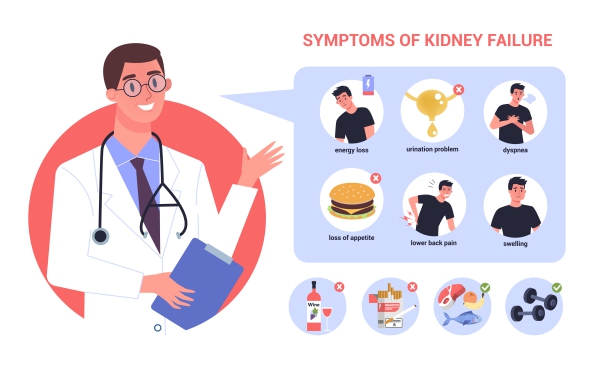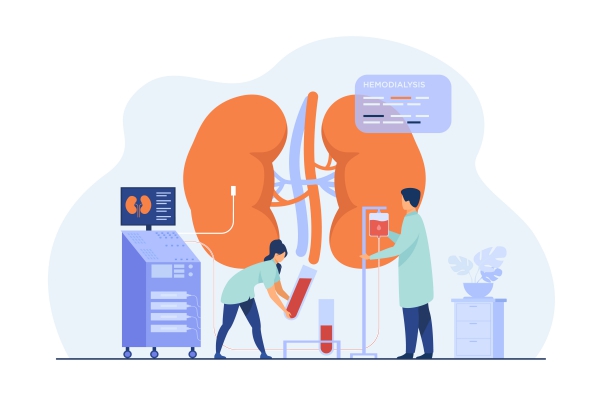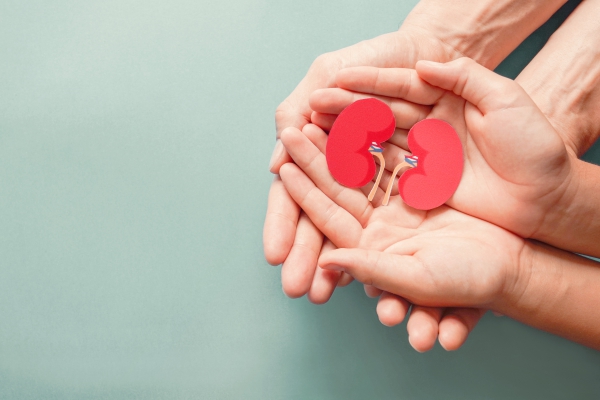What is chronic kidney disease?
Chronic kidney disease, also known as chronic kidney failure, is when there is progressive and irreversible damage to your kidney gradually leading to a complete loss of function of your organ. This usually follows a slow progression occurring over a period of years. At initial stages, chronic kidney disease may not be apparent as your kidney is still able to compensate for the damage present.
Your kidneys are responsible for a variety of functions, namely:
- Maintaining the balance of water, electrolytes, acids and bases in your body
- Excreting waste products accumulating in your body such as urea, creatinine and uric acid
- Retaining important substances required by your body such as glucose and amino acids
- Regulating some hormones such as erythropoietin, calcitriol and renin
If your kidney is damaged, these functions are impaired and will eventually lead to symptoms. This is due to the accumulation of waste products in your body, electrolyte imbalance and excessive levels of fluid accumulating in the body. The symptoms arise when your kidney is severely impaired.
According to the National Institute of Diabetes and Digestive and Kidney diseases (NIDDK), one in ten American adults have some degree of chronic kidney disease. Its prevalence has also been shown to increase with increasing age. The main goal of the treatment of chronic kidney disease is to stop or slow down the progress, finding and treating the underlying cause.

Causes of Chronic kidney disease
There are several diseases known to be the underlying cause of chronic kidney disease. The mechanism behind is that these diseases cause injury to the delicate structures found in the kidney called nephrons. These are responsible to filter blood in order to eliminate waste products from your body. Damage to the nephrons eventually lead to kidney disease.
Chronic kidney disease can arise as a result of:
- High blood pressure: Increased blood pressure can lead to damage to the filtering units present in your kidney.
- Type 1 or type 2 diabetes: Uncontrolled diabetes can lead to an excessive accumulation of glucose in your blood. When the blood passes through the nephron to be filtrated, the excess blood sugar causes injury in your kidney.
- Polycystic kidney disease
- Glomerulonephritis: which is an inflammation of your kidneys.
- Obstruction of the urinary tract: When this occurs, urine from your bladder flows back to your kidney. This causes an increased pressure in your kidney and eventually leads to damage.
- Certain toxins: fuels, solvents and lead for example.
- Autoimmune diseases: such as systemic lupus erythematosus whereby your own body attacks the cells in your kidneys.
- Recurrent kidney infections also known as pyelonephritis.
Risk factors

There are factors that can make you more prone to develop chronic kidney disease. These include:
- Increasing age
- Having a close family member with kidney diseases
- High blood pressure
- Urinary tract infections
- Smoking
- Obesity
- Type 1 and 2 diabetes
- Kidney infections
- Kidney stones
- Kidney structure abnormalities
Signs and symptoms
Chronic kidney disease follows a slow and progressive course compared to acute kidney disease in which symptoms appear and deteriorate rapidly.
There are many signs and symptoms which can be present in chronic kidney disease and these include:
- Blood in urine
- Dark urine
- Decreased urine productions
- Puffy and swollen feet, ankles and hands
- Swelling around the eyes
- Lack of energy
- High blood pressure
- Itchy skin
- Difficulty to sleep at night
- Anaemia
- Loss of appetite
- Nausea and vomiting
- Erectile dysfunction
- Shortness of breath
- Drowsiness
- Loss of weight
The above symptoms do not occur only in chronic kidney disease. They can also arise in a variety of other diseases. It is very important to recognise these symptoms and carry out necessary tests in order to confirm the diagnosis. An early diagnosis can improve your chance of survival.


Making a diagnosis
To diagnose chronic kidney disease, your doctor will first start by taking a proper history to ask you more about your symptoms. This is usually followed by a thorough physical examination to look for signs of the condition. However, it is important that tests are carried out to confirm the diagnosis in order to initiate treatment. These tests may include:
- Blood tests: This should be done to check for the level of waste products in your bloodstream. This can reveal whether your kidneys are not functioning properly leading to an accumulation of waste materials in your body. These include urea and creatinine. Electrolyte levels can also be checked through blood tests. Complete blood counts are done to check for the presence of anaemia.
- Urine tests: A sample of your urine is collected to check for the presence of proteins or blood which indicates presence of damage in your kidneys.
- Imaging tests: these may include magnetic resonance imaging (MRI) scan, computed tomography (CT) scan, or ultrasound scan. The goal is to check for any obstruction to urine outflow, check for the size of the kidneys or the presence of any abnormalities in the kidneys.
- Kidney biopsy: In this procedure, a small sample of your kidney is taken with the help of a needle to be further examined. This can give details on the presence of a kidney disease.
- Glomerular filtration rate (GFR): this calculation is done to assess the extent of kidney impairment by measuring the levels of waste products in the blood and urine.

Treatment of chronic kidney disease
The damage caused in chronic kidney disease is irreversible. Therefore, there is no cure for the disease. However, treatment is available to stop or slow down its progression towards complete kidney failure. It can also help in alleviating symptoms and decrease the risk of having complications.
It is important to find out what is the most likely underlying cause of your chronic kidney disease as this will also have to be managed. The treatment will depend on the particular cause. However, in many cases, even with appropriate control of the underlying cause, the disease will continue to progress.
Patients with this condition may have to take various medications to manage their symptoms and complications of chronic kidney disease. These include:
- Blood transfusions or iron supplements: Since chronic kidney disease can lead to anemia, some patients may need to have blood transfusions or iron supplements to correct their anemia. Iron supplements can either be in the form of tablets or injections.
- Antihypertensive drugs: These may be needed as it is important to lower down your blood pressure to prevent further damage to your kidney. Some examples include angiotensin-converting enzyme inhibitors or angiotensin II receptor blocker.
- Cholesterol lowering drugs: People with chronic kidney disease often have high levels of bad cholesterol. These drugs may then be required to decrease your risk of having a cardiac problem.
- Diuretics: Water retention causes swelling in patients with chronic kidney disease. Diuretics, also known as water pills, help eliminate excess fluids in the body.
- Calcium and vitamin D supplements: This is to protect your bones as they tend to become fragile in chronic kidney disease and can result into fractures.

If your kidneys can no longer remove waste from your blood on their own, this is called end-stage kidney disease (ESKD). The only left treatments are dialysis or kidney transplant.
- Dialysis: In this procedure, a machine is used to filter your blood and remove waste and excess fluid from your body.
- Kidney transplant: This will require a donor kidney to replace your defective kidney. Donor kidneys may come from dead people or live donors. After this procedure, you will have to take certain medications life-long to prevent your body from rejecting the transplanted organ.
Complications of chronic kidney disease
Chronic kidney disease can have severe impact on other organs and parts of your body namely:
- Fluid retention in extremities and in the lungs, also known as pulmonary edema
- High blood pressure
- Acute increase in blood potassium levels which can affect your heart’s normal function and also lead to death
- Cardiovascular diseases
- Weakened bones and fractures
- Anemia
- Decreased immunity
- End-stage kidney disease requiring dialysis or transplant

Prevention
There are several measures that can decrease your risk of having chronic kidney disease. These include:
- Do not exceed the recommended dose of over-the-counter medications.
- Do not smoke cigarettes. If you are smoker, ask about smoking cessation strategies to your doctor.
- Maintain a healthy weight. If you are overweight or obese, talk to your doctor as he/she will advise you on how to lose weight.
- Follow your treatment for other medical conditions that can predispose you to chronic kidney disease.

Source:
J. Alastair, I. and Simon, M., 2016. Davidson’s Essentials of Medicine. 2nd ed. London: ELSEVIER.
Parveen, K. and Michael, C., 2017. Kumar & Clarks Clinical Medicine. 9th ed. The Netherlands: ELSEVIER.
Arora, P., 2020. Chronic Kidney Disease
Centers for Disease Control and Prevention. Prevalence of chronic kidney disease and associated risk factors--United States, 1999-2004. MMWR Morb Mortal Wkly Rep. 2007 Mar 2. 56(8):161-5.


